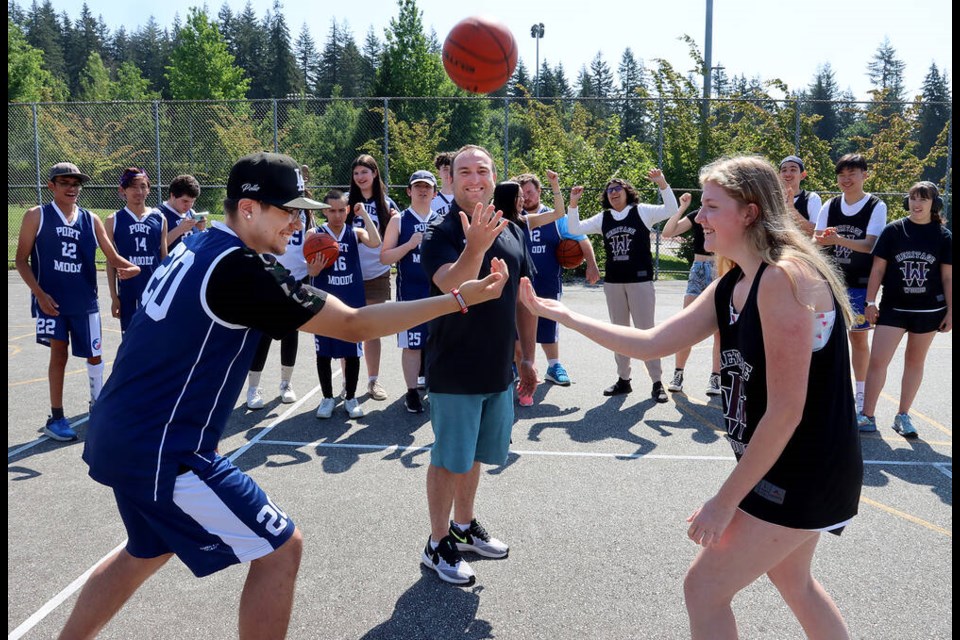Austin Chassie is known as “Captain Hustle” on the basketball court and he couldn’t be prouder of the nickname.
Chassie is one of dozens of neuro-diverse students from six high schools across School District 43 who participated in a unique three-on-three basketball program that could become a template for inclusion in other school sports like soccer.
Mike Viveiros, the athletic director at Heritage Woods Secondary School in Port Moody, said the idea for the unified program that brings together neuro-diverse and neuro-typical students to develop their athletic skills, learn about things like teamwork and perseverance and give them a chance to represent their schools grew from a similar adaptive program he ran for track and field prior to the COVID-19 pandemic. He said basketball seemed a natural progression because many of the kids are already passionate about the sport and it provides them a unique opportunity to be part of a team.
“It ends up being a neglected population,” Viveiros said of the exceptional students who had the chance to participate. “We need to strive for a future where these inclusive opportunities are the norm.”
Last February Viveiros put the word out to his fellow athletic directors and got positive responses from five other secondary schools: Port Moody, Terry Fox, Pinetree, Riverside and Gleneagle.
With some funding and resources from Special Olympics BC and support from the school district they were quickly able to put together a six-week season of jamboree-style games culminating in a championship tournament that was won by the Port Moody Blues.
Saoirse Borden coached the Blues. She’s a Grade 11 student who plays on the school’s varsity girls basketball team. She said working with the players from the inclusion program at PMSS gave her a new perspective on her sport as she broke down the skills and strategies she takes for granted so they could be learned and understood by her charges.
Borden said it was most exciting to see the rest of the students embrace the players and vice versa.
“It opened up our school community,” she said. “There was a lot of support from the student body.”
Ava Taylor said she had a similar experience with her Heritage Woods Kodiaks team. Also in Grade 11 and playing for her school’s varsity side, she was challenged to find a common ground for such a diverse group with different abilities and ways of learning.
“Everyone had a different starting point,” she said.
Alicia Waet said she’d never really participated in sports prior to joining the Kodiaks’ unified team. But with a season now behind her, she said it was “great to make a lot of different connections with people I didn’t know before.”
Teammate Ramtin Rouhi said being on the team “made me feel awesome” and helped develop his skills in shooting and defending.
Viveiros said the players’ enthusiasm is infectious.
For the championship tournament, the gym at Heritage Woods was packed.
Terry Fox Secondary had the support of its own cheerleading squad.
And when the Blues returned to Port Moody Secondary with the first place trophy, the team was greeted by the school’s marching band.
Viveiros said the success of unified basketball’s first season is the kind of breakthrough that could increase inclusionary sporting opportunities at schools in the Tri-Cities and beyond.
Already there’s been inquiries from other school districts like Surrey and Delta.
“Why aren’t we celebrating these kids like this?” he asked. “It really gets me emotional every week watching the successes of these students playing alongside their peers in the student population.”
But for Captain Hustle, aka Austin Chassie, the reward is more fundamental.
“I like making opportunities for my guys, help them be better at everything,” he said.


